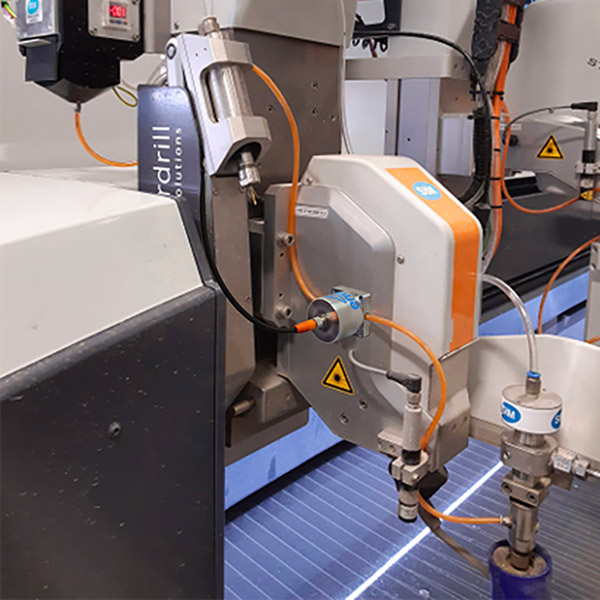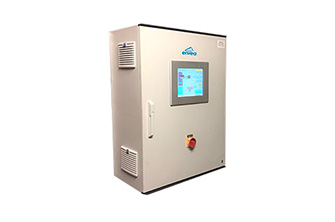
Flow monitoring to control the dosing of abrasives
Waterjet cutting systems | FlowJam T
Customer: STM waterjet GmbH; Producer of waterjet cutting systems
Material: Abrasives
Quantity: 50 – 400 g/min
Installation: Just before the abrasive focusing jet
Function: Control of the abrasive injection during the cutting process
APPLICATION
In waterjet cutting systems, materials are cut or deburred with the help of water and depending on the end product an abrasive. Very high precision is required here, which is why the monitoring of the water dosage and the abrasive dosage play an important role. Both dosages should be monitored constantly to ensure a smooth process. Different materials have to be cut with different abrasives in different quantities.
It is important that the abrasive dosage remains constant. Waterjet cutting systems are used because of their high accuracy and their versatility. Too much or too little abrasive in the waterjet can lead to unclean cut edges. Furthermore, an increased amount of abrasive leads to higher process costs.
It is important that the abrasive dosage remains constant. Waterjet cutting systems are used because of their high accuracy and their versatility. Too much or too little abrasive in the waterjet can lead to unclean cut edges. Furthermore, an increased amount of abrasive leads to higher process costs.
SOLUTION
The FlowJam T is a sensor that has been specially developed for monitoring the flow of solids that are conveyed though hose lines. The sensor can be used for hose lines with outer diameters between 4 and 25 mm.
The material flow in the hose line is detected with the help of the triboelectric effect. This means that even very small amounts of the material can be measured in all non-conductive hoses.
Due to its very small and simple design, the FlowJam T can be retrofitted in almost any system. The measuring plates under the housing can be freely selected and easily adapted to new hose diameters. In addition, the FlowJam T is almost maintenance-free due to the fact that it measures without being installed in the flow.
In the application described, a continuously constant abrasive dosage can be ensured by determining the material flow. In addition, it can be ensured that neither too much nor too little abrasive is used during cutting.
The material flow in the hose line is detected with the help of the triboelectric effect. This means that even very small amounts of the material can be measured in all non-conductive hoses.
Due to its very small and simple design, the FlowJam T can be retrofitted in almost any system. The measuring plates under the housing can be freely selected and easily adapted to new hose diameters. In addition, the FlowJam T is almost maintenance-free due to the fact that it measures without being installed in the flow.
In the application described, a continuously constant abrasive dosage can be ensured by determining the material flow. In addition, it can be ensured that neither too much nor too little abrasive is used during cutting.
CUSTOMER BENEFITS
- Quality optimization through immediate signalling of quantity changes during abrasive dosing
- Avoidance of high production costs due to excessive material costs
- Reduction of faulty batches
Related content
Download the case study
FlowJam T
FlowJam T datasheet
Information request


